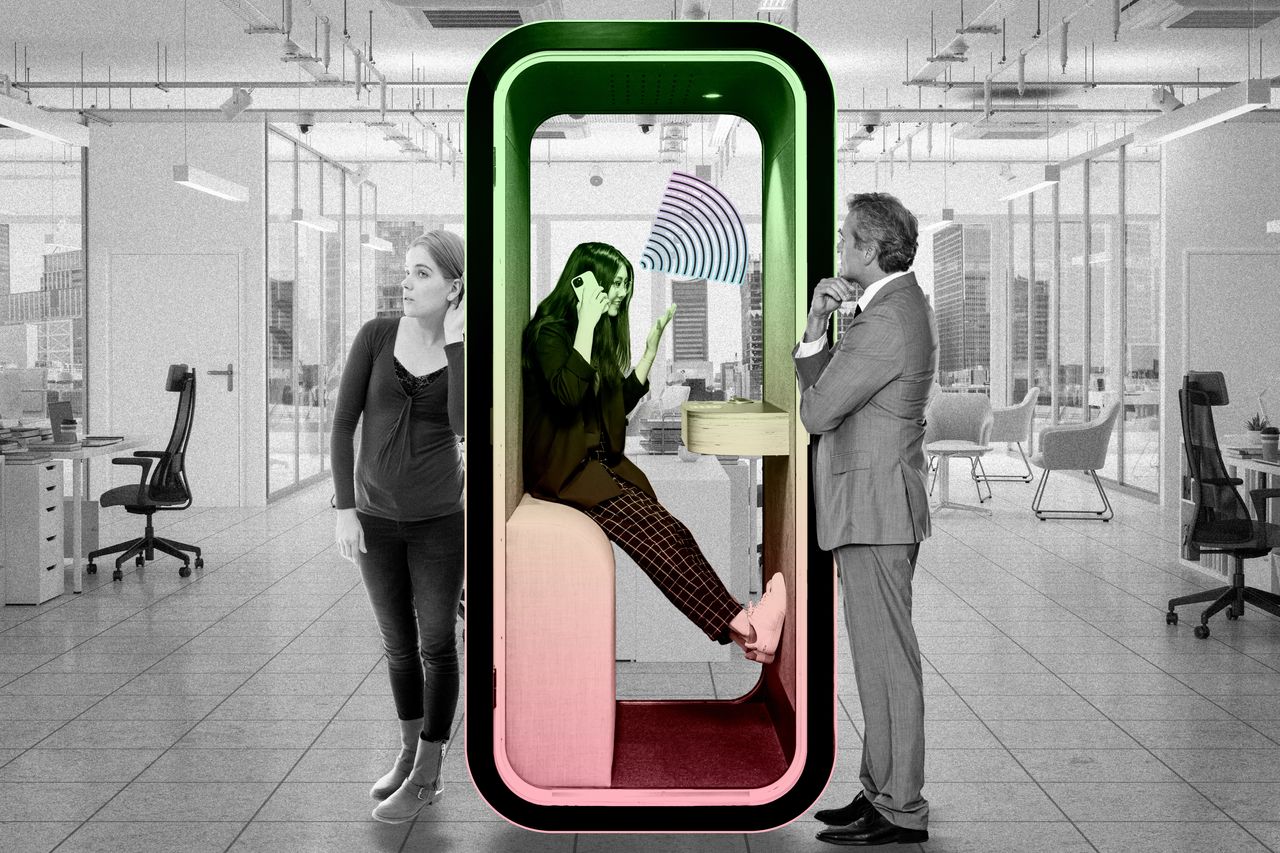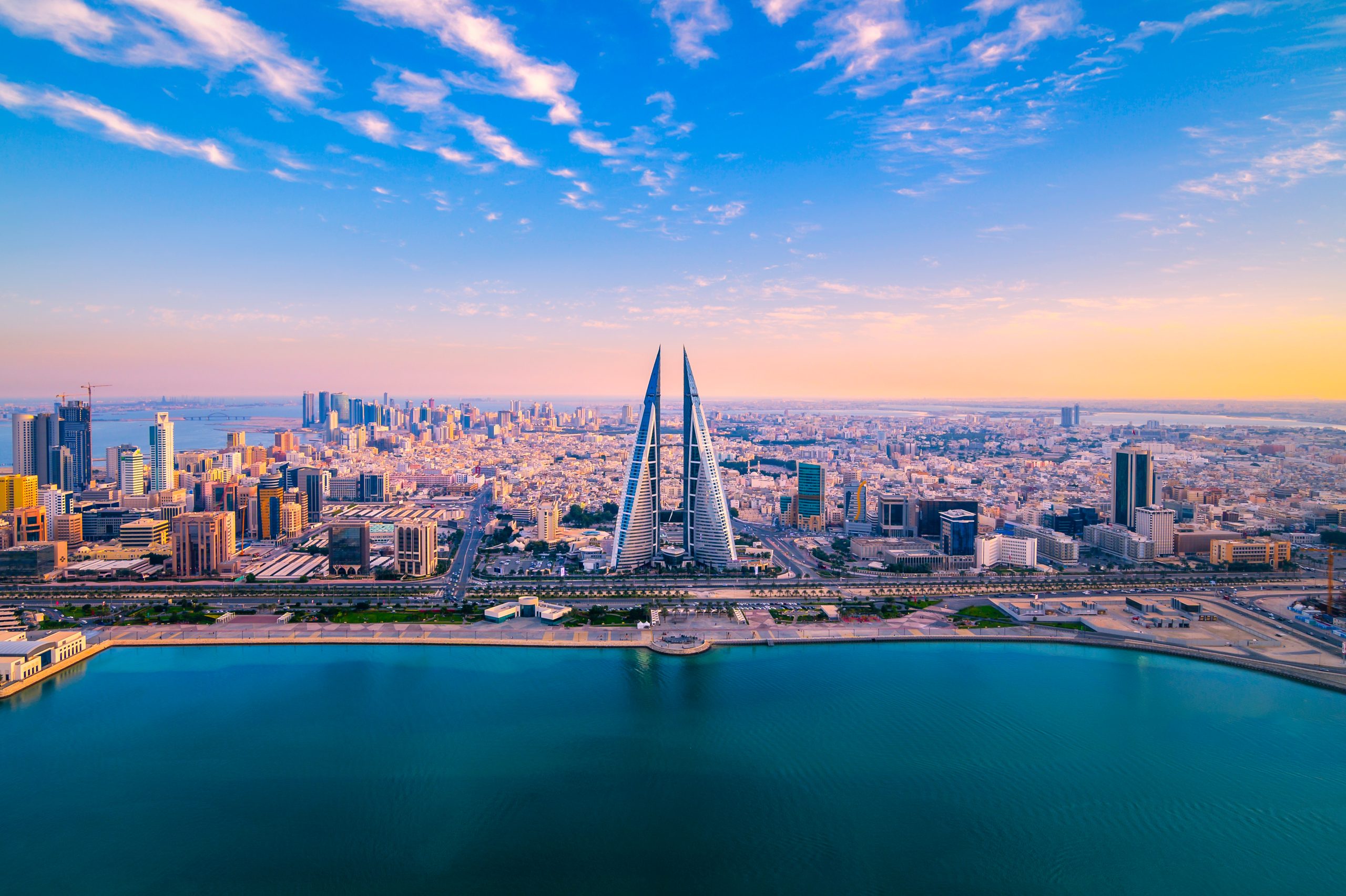THE REASON THE OFFICE ISN’T FUN ANYMORE
RIP eavesdropping. Employees are now hiding out in privacy booths or empty conference rooms, turning workplaces into quiet zones. ‘It’s weird.’
When David Witting prepared digital-marketing agency Dept@’s Boston-area offices for employees’ return in 2022, he ordered trendy couches, chairs and high tables, envisioning lively collaboration and banter.
Yet when his co-workers arrived, many skipped the furniture and gravitated toward the private booths scattered in the office. Since then he’s jettisoned some of the furniture, and added more booths.
“People are coming in to do occasional big meetings, but really the rest of the time, they want a quiet private spot to get on a Zoom call,” said Witting, a partner at the company. “It’s weird.”
As Covid-19’s remote-work surge fades, some workplaces are quieter and odder than ever. Employees have returned only to park themselves in deserted conference rooms or sound-muffling chambers. Colleagues grumble about booth-hogging co-workers, and some companies have started enforcing time limits on them.
The pods, some resembling old-school telephone booths, have emerged as one of the hottest segments in the $24 billion North American office-furniture industry. Manufacturers such as Room, Nook and Framery say business has been brisk. But some workers and managers say more booths means less eavesdropping, less gossiping, less camaraderie and less fun.
“It’s strange,” said William Blaze, a technology recruiter and consultant, referring to colleagues who end up occupying booths for much of their workdays. Blaze, who lives in Atlantic Highlands, N.J., observed the phenomenon while working at tech companies from 2021 to 2023, as well as at a client’s Manhattan co-working office where he now works two days a week.
“It seems that the goal of returning to office has been to create a rowdy buzz,” said Blaze. “We’re not seeing that.”
Janet Pogue McLaurin, global director of workplace research at architecture and design firm Gensler, said workplace privacy has never been more important. Many of the firm’s clients, which include big companies such as Amazon, have more than doubled their booths and other private or semiprivate areas since the pandemic.
“This is a huge trend,” she said.
Demand for privacy has office architects and landlords scrambling to rearrange layouts. Open-plan offices, often dreaded by employees, are now being peppered with pods and booths that scream “do not disturb.”
Jamie Hodari, chief executive of global co-working company Industrious, said some workers are monopolising private areas in office spaces that were designed for professionals to connect with other professionals. “We see a lot more people linger for two hours post-phone call or a Zoom call because they like having a little space to themselves.”
Booth-inclined office workers say their needs have changed post-Covid, and they have a harder time concentrating among noise and distractions.
At CrowdComms, a U.K.-based maker of event technology, managing director Matthew Allen got used to working in near-silence at the office during the pandemic. When colleagues returned, their phone calls—even at normal volume—annoyed him so much he bought a sound-dampening booth.
Though it was ostensibly for the entire office, he soon moved in.
“It’s quite selfish,” said Allen, who has added a trio of plants. “I think it has very much become my home.”
On social-media sites such as X, Reddit and TikTok, employees generally celebrate the booths. Even Chatty Cathys are seeking them out. One X user tweeted that she locks herself in an office phone booth most days because she talks too much.
Others vent about booths’ poor ventilation and small size, or their aesthetics. Kirsten Auclair, a biomedical researcher in San Francisco, shudders at the harsh lighting in the booths she uses to take Zoom calls at work.
“It casts like the worst shadows, you look just kind of, like, on the brink of death,” she said. Still, Auclair considers the oasis from colleagues’ noise an office lifesaver.
Booth manufacturers insist their products can coexist with collegiality. SnapCab founder and CEO Glenn Bostock said the glass walls of his company’s pods allow for a sense of connection with co-workers.
“They can see you,” he said. “You can wave at them. You can still interact with people visually but you get that audio privacy.”
Other products seek a different balance between isolation and community. Furniture maker Steelcase offers a desk-encircling tent meant to ensure “territorial privacy” instead of silence. Nook, headquartered in the U.K., makes hut-shaped hideaways intended to provide a sense of psychological safety without being completely enclosed.
Nook founder David O’Coimin said an office filled with phone booths “is like you have a jail instead of having a workplace.”
Furniture distributor Thinkspace sells booths that Sid Meadows, principal and vice president, said are designed to allow a low level of outside sound. Humans are wired to crave some background noise, he said, pointing to popular YouTube videos of ambient office chatter.
That matches the findings of a study co-authored by Dr. Esther Sternberg, director of the University of Arizona Institute on Place, Wellbeing and Performance. She and colleagues discovered people became stressed when their surroundings were too quiet as well as too loud. The typical volume of birdsong, at 45 decibels, appears to be just right.
Nick Fine, a user-experience researcher in London, describes himself as an “old school, pre pandemic office worker” who enjoys the hubbub of a busy workplace. But the now-hybrid worker still spends considerable time in an enclosed pod to work without overhearing his colleagues’ chatter on days he’s in the office.
“I have ADHD and working in a pod engages my hyper focus,” he said, adding he likes having the booth option when the din is too much.
Farmer’s Fridge, which sells fresh salads out of vending machines, has eight pods made by Zenbooth and a plethora of conference rooms in its Chicago office. It offers about 40 hideaways for the 85 people who work there, yet that bounty of isolation isn’t always enough, even for the CEO.
“I actually live three minutes from here,” said Luke Saunders, also the company’s founder. “If I really have to get work done, I do it at home.”
 Copyright 2020, Dow Jones & Company, Inc. All Rights Reserved Worldwide. LEARN MORE
Copyright 2020, Dow Jones & Company, Inc. All Rights Reserved Worldwide. LEARN MORE
Chris Dixon, a partner who led the charge, says he has a ‘very long-term horizon’
Americans now think they need at least $1.25 million for retirement, a 20% increase from a year ago, according to a survey by Northwestern Mutual
Saudi Arabia ranked first among countries for the non-oil exports of national origin with BD201 million (22%)
Bahrain’s non-oil exports of national origin decreased by 6% to BD894 million ($2.37 billion) in Q2 2024 compared to the same period in 2023. The top 10 countries accounted for 64% of the total export value.
According to the Information & eGovernment Authority (iGA) in its Q2 2024 Foreign Trade report, Saudi Arabia was the leading destination for these exports, totaling BD201 million (22%). The US followed with BD75 million (8.4%), and the UAE with BD73 million (8.2%).
Unwrought aluminum alloys were the top exported product in Q2 2024, amounting to BD267 million (30%), followed by agglomerated iron ores and concentrates alloyed at BD159 million (18%) and non-alloyed aluminum wire at BD49 million (5%).
Non-oil re-exports
Non-oil re-exports increased by 4% to reach BD206 million during Q2 2024, compared to BD198 million for same quarter in 2023. The top 10 countries accounted for 86% of the re-exported value. The UAE ranked first with BD58 million (28%) followed by Saudi Arabia with BD39 million (19%) and UK with BD17 million (8%).
As per the report, turbo-jets worth BD65 million (32%) were the top product re-exported from Bahrain, followed by private cars with BD11 million (5%) and four-wheel drive with BD9 million (4%).
The value of non-oil imports has decreased by 4% reaching to BD1.41 billion in Q2 2024 in comparison with BD1.47 billion for same quarter in 2023. The top 10 countries for imports recorded 68% of the total value of imports.

China Bahrain’s biggest importer
China ranked first for imports to Bahrain, with a total of BD191 million (14%), followed by Brazil with BD157 million (11%) and Australia with BD112 million (8%).
Non-agglomerated iron ores and concentrates were the top product imported to Bahrain worth BD200 million (14%), followed by other aluminum oxide with BD101 million (7%) and parts for aircraft engines with BD41 million (3%).
As for the trade balance, which represents the difference between exports and imports, the deficit logged was BD310 million in Q2 2024 compared to BD322 million in Q2 2023.
Chris Dixon, a partner who led the charge, says he has a ‘very long-term horizon’
Americans now think they need at least $1.25 million for retirement, a 20% increase from a year ago, according to a survey by Northwestern Mutual





















